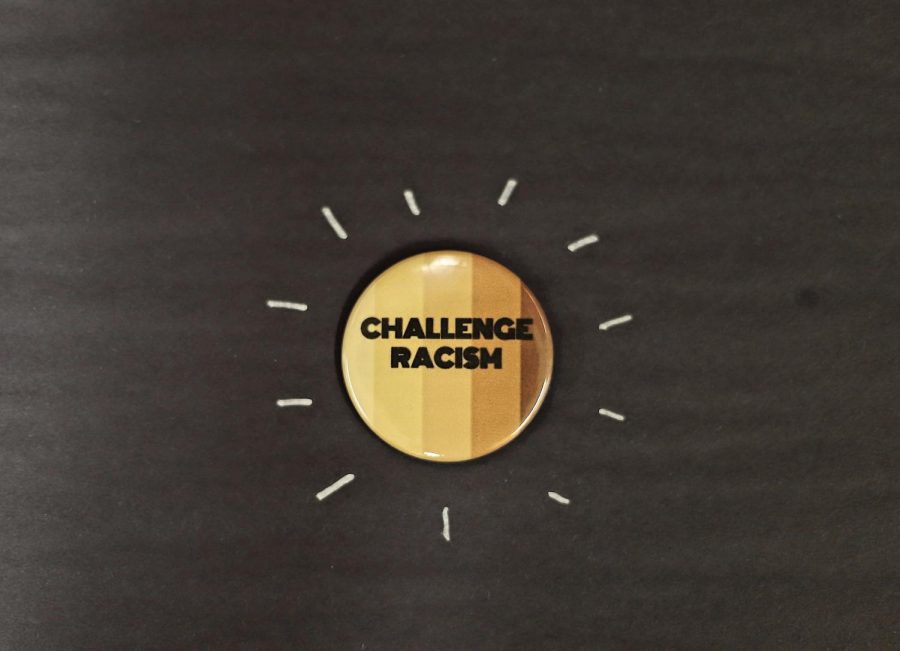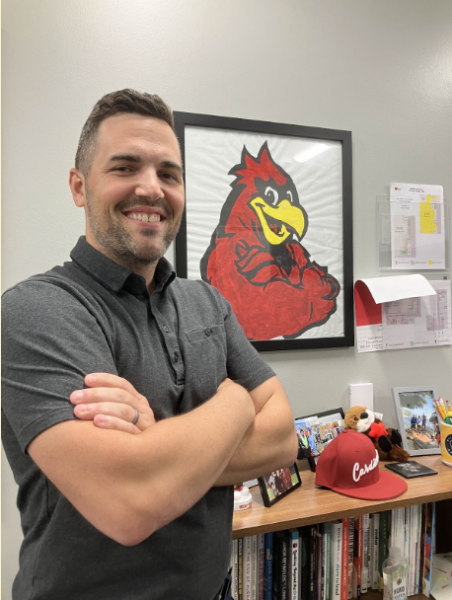Do Racial Slurs Have a Place in Education?
A student-created pin that encourages students to challenge racism.
In early January, a Middleton teacher was placed on leave after reportedly using a racial slur during class.
According to multiple student accounts, the teacher was reprimanding students who were using the n-word in her classroom. While she was reprimanding them, the teacher restated the racial slur instead of replacing it with a euphemism. The racial slur was not directed at a student or any other individual, according to the accounts. A student’s complaint was then brought to school officials, resulting in the teacher being placed on leave.
When asked to confirm or deny this account, Perry Hibner, Director of Communications for MCPASD, declined to comment on the details of the incident. He explained that the Board of Education is expected to discuss the incident at their meeting on Monday, February 4. Should any resolution happen at the meeting, details should be released within 24 hours.*
This incident raises important questions in our school community about the place, if any, that racial slurs have in an educational environment.
One place that this question becomes especially prevalent in education is English classes, where students often study classic texts that contain racial slurs in the dialogue. Two such books that MHS English students read are Of Mice and Men and To Kill a Mockingbird. In a classroom setting, what rules apply when reading the text aloud? Do certain people have a right to say racial slurs, such as the n-word, over others? How can we balance the need to explain the historical context of racial slurs to a new generation with the politically correct environment surrounding the use of those slurs today?
Elise Johnson, an AP English Language and Composition teacher new at MHS this year, used to include To Kill a Mockingbird in her curriculum at Baraboo High School. “We always started the unit with like an exploration into the Jim Crow era, just to get some context before we move into the text itself,” she explained in an interview. “In a predominantly white community, I think that helps just to let kids know what it was like at the time.”
Johnson would also explain the historical significance of the n-word as it was presented in the text, and explain to the class what her policy on reading the word aloud in the book was. “I don’t know if this is the right thing to do, because I have no idea,” Johnson said, but she would tell her class that the words were included for a reason. When they read the book aloud, it was their choice whether to say it or not. Johnson personally chose never to read the n-word aloud.
A teacher who no longer works at Middleton employed a similar approach when she taught the book Of Mice and Men to a freshman English class – except she chose to read the n-word aloud as it was written. According to students, they did not talk much about the use of the word or the history of racism in the United States during that unit. Tess Lincecum, a current MHS senior who was in that class her freshman year, explained, “I don’t think we were very well-equipped to read that book, especially with the way that our teacher was just reading it out loud, saying the n-word, like, not asking us any questions about how we felt about it . . . I think we definitely should’ve had more education on the history of the word, the history of racism in our country, along with that reading.”
Johnson doesn’t know if there is necessarily one right solution. “I wish someone would tell me what’s appropriate, but I don’t know who would have the authority to do that,” she said. “Because I don’t think, like, African-Americans can speak for all African-Americans, or, like, even a principal, no matter what his or her race is, necessarily should have the authority.”
When asked if she noticed a difference in the way that Middleton approaches subject matter containing racial issues compared to her old school, Johnson said yes. “I think that Middleton does a better job of seeking out diverse voice in the texts we select,” she said. She told a story as an example. When Johnson arrived at MHS, she asked if there was a U.S. Literacy class here. Another English teacher explained to her one of the reasons that Middleton does not: we have enough white male voices in classes here. “Teachers here are much more conscious of the information they are giving out and really think about, ‘Hey, maybe enough white males, and so what other voices can we include?’” she said.
Percy Brown, the Director of Equity and Student Achievement at MHS, also thinks that diverse voices are essential in the classroom. “I know that we have systems [that] will protect [certain] books, right. And justify, hey, we gotta keep it because it’s a classic,” he said in an interview. “But are we balancing the scales by ensuring that, you know, we’re incorporating Black literature or Latino literature so that we’re receiving counter-narrative stories and authors that can speak on those times, right, but from their narrative and perspective and not from someone who was white?”
With classic books that contain racial slurs, Brown thinks that it is essential to teach the history behind the words and the era. He has helped MHS teachers put together lesson plans to do so in their classrooms. “For me, the best way to really combat or counter what we’re seeing in our schools, whether it be students or staff using racial slurs, is to educate,” he said.
Brown is taking the chance to expand the lesson beyond English classrooms. Over the past few years, Brown explained, MCPASD has seen an uptick in some students making social media posts or making comments referencing the N-word. This, coupled with the incident of a teacher stating a racial slur in early January, prompted Brown to do a Human Rights Week presentation titled “The Truth About the N-Word.”
He explained the gist of his presentation. “I think some people feel like there are appropriate times to use that word in whatever context they try to justify using it, but for me as a black man, and not speaking as the Director of Equity and Student Achievement knowing the history of the word, knowing that it was invented by white colonialists who subjugate and dehumanize black people for well over 244 years, which is the time period that blacks were enslaved in America, I think if people understood the true nature behind why that word was invented and what it actually represents, I think people – well, I would hope would come to the conclusion that there is no appropriate context to use that word,” he said.
Brown explained that there is a difference between the n-word with an ‘ER’ ending and the n-word with an ‘A’ ending. The n-word with an ‘A’ ending has a very different meaning than the n-word with an ‘ER’ ending. The black community has reclaimed the n-word with an ‘A’ through hip-hop. “And for the black community, that’s something that we’ve embraced to use as a term of endearment,” he said. However, Brown wonders how white people interpret the situation when they hear black kids using the n-word with an ‘A,’ and if they hear the n-word with an ‘ER’ ending instead.
Issues of racism in our community extend far beyond the words used in hallways and classrooms. Brown talked about his own experience as a black man working in the school district to illustrate this point. He started working at MHS in 2012 as the Dean of Students. At the time, Brown was one of two or the only certified black staff in the entire district. Two years later, in 2014, the district asked him to fill a full-time position as the Director of Equity and Student Achievement. At that time, the overall staff of color in the district was only 2%. At the administrative level, that number was only 3% – “and I made up the 3%,” Brown said.
When he became the Director of Equity and Student Achievement, Brown also became the first person of color to be a part of the executive team in the district. “So, when you think about, you know, the history of racism in the United States, and laws that prevented, you know, people of color from having access to opportunities, you know, it’s kind of like, wow, 2014, it took that long for Middleton to have a person of color sitting at the executive table?” he said.
Brown mentioned one reason why issues of race can become very complex. “I think it’s very hard for my white brothers and sisters to really understand what people of color go through, right, in terms of lived experiences,” he said. “And oftentimes, when grievances are put out there in terms of what people of color experience, this is really hard for white folks to understand why, you know? Because, you know, America was built on this idea of meritocracy: you know, you work hard, you pull yourselves up by your bootstraps, you can make it. But if you go back throughout history, you know, even if black folks were doing all the right things, there were laws put in place, policies put in place, that prevented us from being able to have access and history . . . And we never consider or think about, well, what’s the generational impact of decisions, policies, and laws that were passed, you know, way back in the day.”
Johnson also talked about the impact of the past on our current situation. She drew a connection to a book she read about the Native American experience. In the book, the author grappled with what terminology was acceptable – natives? Native Americans? Indians? “And, this man who spoke with the author quite a bit basically said, ‘Maybe it’s good that you feel uncomfortable. Because, like, you should be thinking about – specifically about your word choice, and how what has been done in the past impacts us as a whole. So the fact that you do kind of, like, have to pussyfoot around what terminology is appropriate – like, serves you right, perhaps,’” Johnson said. “And so, I think maybe it’s in this situation too, where maybe it serves us right that we don’t know how to, like, deal with this issue, and we don’t know what the proper answer is.”
There will never be a perfect solution to the racial issues that plague our community and our country. It’s hard to ask questions when you don’t know the answers, but it is only when we raise discussions with the people around us that we can hope to make progress. “[Today], we’re 20% staff of color at the administrative level, which is a 17% increase,” Brown said. “Overall staff is going from 2% to 12.5% in four years. So we’ve made some progress, and we’ve also seen a spike in our graduation rates for Black and Latino students. Which is a sign that we’re making progress, but I’d still argue that we have a long way to go.”
*As of February 5, 2019, the Board has not yet voted on anything regarding the MHS staff member who used a racial slur during class. In an email, Hibner said it will now take place at the Board meeting on Monday, February 11. Hibner added that the teacher in question has resigned “due to the turmoil that this situation has created.” He confirmed the account reported by The Cardinal Chronicle, saying, “What happened at Middleton High School on Wednesday, Jan. 16 was unfortunate. In an effort to respond to a student’s use of a racial slur in the classroom, a teacher addressed the student with the intention of communicating that such terms are offensive and their use is unacceptable. The teacher recognizes, however, that in trying to clarify what was unacceptable, they repeated the words, and this had an adverse impact on some students.” The Cardinal Chronicle will update this article as further information is released.










